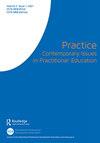Think piece: ethics for the virtual researcher
Q2 Social Sciences
引用次数: 0
Abstract
ABSTRACT In ethics, there are profound distinctions between conducting research online and traditional face-to-face research methods. Some of the differences often appear overwhelming for individuals in the early stages of their research career due to the introduction of new technical terminology related to the online environment. Whilst ethics in the virtual world is complex due to complete confidentiality and anonymity becoming increasingly out of reach, there are ways to mitigate against these new challenges. When applying for ethical approval, I argue that students should consider how their online research challenges ethical norms for obtaining informed consent, determine what is public and private data, and define confidentiality and anonymity in the virtual world. The author is a former PhD candidate, and some of the themes discussed in this think-piece presented themselves in the data collection of online surveys. Furthermore, the author has sometimes observed an absence of thought to online ethics from dissertation students when applying online methodologies. Thus, this piece attempts to stimulate thinking in this area and is aimed at individuals involved in the submission of ethics for dissertation projects.思考篇:虚拟研究者的道德规范
在伦理学上,在线研究与传统的面对面研究方法有着深刻的区别。由于引入了与网络环境相关的新技术术语,在研究生涯的早期阶段,一些差异往往对个人来说是压倒性的。虽然由于完全保密和匿名变得越来越遥不可及,虚拟世界中的道德规范变得复杂,但有一些方法可以缓解这些新挑战。在申请伦理批准时,我认为学生应该考虑他们的在线研究如何挑战获得知情同意的伦理规范,确定什么是公共数据和私人数据,并定义虚拟世界中的机密性和匿名性。作者曾是一名博士候选人,在这篇思考文章中讨论的一些主题在在线调查的数据收集中得到了体现。此外,作者有时观察到论文学生在应用在线方法时缺乏对在线伦理的思考。因此,这篇文章试图激发这一领域的思考,并针对参与论文项目伦理提交的个人。
本文章由计算机程序翻译,如有差异,请以英文原文为准。
求助全文
约1分钟内获得全文
求助全文

 求助内容:
求助内容: 应助结果提醒方式:
应助结果提醒方式:


